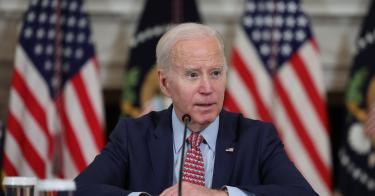President Joe Biden's muddled approval of oil exploration in Alaska—and his move last month to increase offshore drilling—are textbook examples of the perils of trying to pander to all while pleasing none.
The Willow energy project offered the president his first major opportunity since his cancelation of the Keystone XL Pipeline to signal to Americans that he values their energy security more than an extremist climate agenda. But he blew it.
Biden approved exploration of three drilling sites in Alaska. Eventually this should yield up to 180,000 barrels of oil per day.
But Biden drastically scaled down the scope of exploration. He further demonstrated his anti-fossil fuel agenda by announcing new rules that will make half of the National Petroleum Reserve-Alaska off limits for new leases. These measures effectively erase the strategic benefit of America's private Arctic reserves.
This two-faced approach to energy policy is an equal opportunity offender. Biden's Green New Deal-supporting base is already suing to block the Willow project. Meanwhile, working families must pick up the tab for skyrocketing costs with no relief in sight. Last Wednesday's announcement of expanded drilling in the Gulf of Mexico—a concession needed to secure passage of the Inflation Reduction Act—may eventually deliver 1 billion barrels of oil but will take years to hit the market.
>>> Biden’s Latest Fuel Proposal Promises To Drive Gasoline Prices Higher
During Biden's first two years in office, the price of gas doubled, hitting $5.00 per gallon in June 2022. Consumers have seen home electricity prices increase 15 percent and natural gas climb 40 percent.
The White House repeatedly claimed there's nothing it can do. The administration blamed Vladimir Putin, or Donald Trump, or greedy oil corporations, or mom-and-pop gas station owners. But none of these control exploration and development of federal lands.
Biden's approval of Willow does little to disguise the Left's long-term ambitions of forcibly eliminating fossil fuels from the energy grid to achieve net-zero carbon emissions by 2050. This policy is woefully naïve, damaging—and unnecessary. Comprehensive reports from the Electric Power Research Institute and the North American Electric Reliability Corporation confirm it would be very difficult to keep the lights on and achieve net-zero-emissions simultaneously.
Net Zero is also a job killer—something that won't fly with voters in key swing states where natural gas and energy production abound. A recent poll by the Commonwealth Foundation found that, when setting priorities for energy and environmental policies, voters are three times more likely to identify costs (59 percent) as they are environmental consequences (16 percent). Politicians ignore the overwhelming will of their constituents at their own peril.
Pennsylvania, rich in energy reserves and a key bellwether state, has emerged as a nationally significant player on energy policy and a must-win electoral battleground in deciding control of Congress and the White House. Not only does Pennsylvania top the list of states most visited by Joe Biden in the lead up to 2024, it's no secret that Governor Josh Shapiro harbors presidential ambitions of his own.
Shapiro paved his path to the governor's mansion with promises to work with Republicans and Democrats in the state legislature to reconsider participation in the Regional Greenhouse Gas Initiative (RGGI). A multistate agreement intended to reduce emissions, RGGI is effectively a carbon tax levied on businesses and consumers within participating states. Former governor Tom Wolf entered Pennsylvania into the agreement via executive fiat, but that move has been stayed by the Pennsylvania Supreme Court. It is estimated that RGGI will increase electric bills by 30 percent and eliminate tens of thousands of jobs in the commonwealth.
>>> Policies in the Lower Energy Costs Act Will Lower Energy Costs and Increase GDP
On the campaign trail, Shapiro repeatedly expressed his "real concerns about the impact [RGGI] will have on consumer prices, hurting families at a time when many are struggling really to put food on the table." But he included funding from RGGI in his proposed budget, indicating a desire to move forward. Shapiro still has time to follow through on his campaign commitments, but the time to end his strategic vagueness on the issue is fast approaching.
Implementing RGGI will not only cost consumers; it could hurt Biden and Shapiro at the ballot box in 2024. The Commonwealth Foundation poll shows that support among nearly 7 out of 10 Pennsylvania voters—including Democrats and Independents—declines upon learning the cost.
Polling shows voters are not buying Biden's vilification of oil producers as the cause of rising prices. On energy policy, the president's disapproval rating (59 percent) exceeds that of energy companies (50 percent).
Good policy makes for good politics—something clearly forgotten by Biden, Shapiro, and others who seem intent on pursuing a plan that will destroy American energy production, cost consumers, and alienate the electorate.
This piece originally appeared in Newsweek




